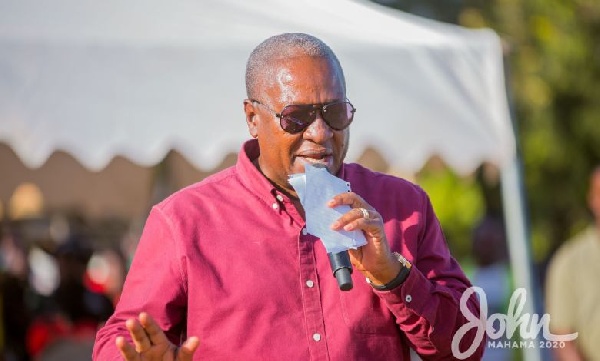Ghana recorded its most prosperous economic mg’t under Mills – Mahama
"We had the highest levels of economic growth before oil production kicked in. For instance, in 2010, we grew at 8% without oil and at 14.4% with oil in 2011, the highest in 40 years
- Advertisement -
Former President John Dramani Mahama has said that since the days of former President Jerry John Rawlings and even before then, economic shocks have cyclically derailed incremental progress made over the years.
The older generation, he said, would recall how bush fires and droughts in the early 80s plunged the Ghanaian economy into crisis, leading to lengthy periods of negative growth and very high inflation.
By dint of hard work and skillful management, he said the Provisional National Defence Council (PNDC) government managed to salvage the economy and brought back sustained positive economic growth until this was again undermined by falling commodity prices which led to dwindling export revenues in the late 90s.
When the Kufour administration took over, he said, the country to Heavily indebted poor countries (HIPC) in order to secure debt relief.
Up to $3.8 billion of Ghana’s debt was written off and this offered significant fiscal space, the National Democratic Congress (NDC) presidential candidate in last year’s elections said.
“At this period too, there was a transition in the structure of the economy from one led by agriculture to one led by the service sector.
“In the latter years of the President John Agyekum Kufour Administration, we discovered oil in commercial quantities, and we joined the league of oil producing countries. A global financial crisis reared its head around this time, and this also impacted our economy negatively.
“In came the Mills administration under which I had the privilege of serving as Vice President and Head of the Economic Management Team. We in turn inherited a large budget deficit and huge arrears as well as a depreciating currency. Many people tend to overlook the fact that it was during this era that Ghana recorded its most prosperous period of economic management.
“We had the highest levels of economic growth before oil production kicked in. For instance, in 2010, we grew at 8% without oil and at 14.4% with oil in 2011, the highest in 40 years.
“Non-oil growth for that year was 8.4%. The following year, 2012, we grew at 9.3%. We achieved the longest sustained period of single digit inflation of 33 months, among several other notable milestones.
“The cyclical shocks came back with a vengeance between 2013 and 2016. These included problems with power production when unreliable gas supplies and frequent breakdown of power generation equipment resulted in a power crisis that severely affected our economy,” he said in a speech on the state of the economy forum organised by the NDC pro-forum Monday, September 06.
He added “This was compounded by huge revenue shortfalls in the oil sector because of lower-than-expected production from our only oil field at the time.
“When confronted with these challenges, we put in real effort to address them comprehensively and laid down critical structures that today have become some of the most important pillars supporting the Ghanaian economy. When we inherited the oil economy in 2009, we put in place the necessary mechanisms and institutional arrangement to ensure that we derived maximum benefit.We passed the PRMA under which we set up the Stabilization and Heritage Funds with about $ 500 million in them at the time we left power in 2017. We tackled the power crisis too head-on and by the time we left office in January 2017, we had sufficient generation capacity to withstand future shocks.
“We brought stability and reliability to fuel supply for power generation when we built the Atuabo Gas plant to process gas.
“We set up ESLA, which by 2024 should have yielded up to GHS 40 billion. This stands us in good stead to overcome the stifling legacy debts in the energy sector and help address the liquidity challenges in the sector. We set up the Ghana Infrastructure and Investment (GIIF) to mobilize capital to undertake major infrastructure projects and one of its first success stories is Terminal 3 at the Kotoka International Airport.
“We also established the Ghana Exim Bank to promote trade and commerce within the Ghanaian economy. We had the Sinking Fund, which is a mechanism through which we would set aside funds to retire maturing debt. As of 2016, we had saved up to $550 million to pay off the first sovereign bond floated under President Kufour.
“We had the contingency fund from which we found money to underwrite the relief effort in the aftermath of the June 3rd Disaster. We did all of these alongside massive investments in capital projects with the view to accelerating our economic development. We ensured that we kept our public debt within manageable limits with debt amounting to 56% of GDP.”
Source: 3news
- Advertisement -
- Advertisement -


